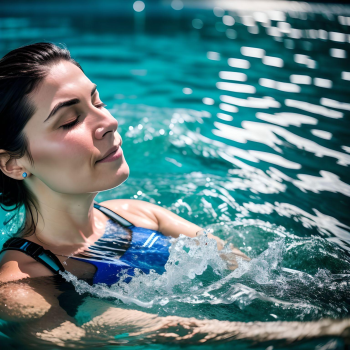In the pursuit of optimal mental well-being, individuals have sought various methods to alleviate stress, enhance mood, and promote mental resilience. One practice that has gained increasing attention in recent years is cold water immersion therapy. This unique approach involves exposing the body to cold water, often through techniques such as ice baths or cold plunges. While the idea of subjecting oneself to icy water might seem daunting, scientific research and anecdotal evidence alike suggest that cold water immersion therapy can be a powerful tool for enhancing mental health.
The Science Behind Cold Water Immersion Therapy
Cold water immersion therapy operates on the principle of cold exposure, which triggers a series of physiological responses within the body. When the body is exposed to cold water, it initiates a process known as vasoconstriction. Blood vessels constrict in response to the cold, causing a reduction in blood flow to the skin’s surface. This process is the body’s way of conserving heat and maintaining core temperature.
As the body adapts to the cold, a surge of hormones, including norepinephrine and adrenaline, is released. These hormones are responsible for the invigorating sensation often associated with cold water immersion. They stimulate the nervous system, leading to increased alertness and improved mood. Moreover, cold exposure triggers the release of endorphins, which are natural painkillers and mood enhancers. These physiological responses collectively contribute to the positive impact of cold water immersion therapy on mental health.
Benefits for Mental Health
Stress Reduction: Stress is a pervasive aspect of modern life, and finding effective ways to manage it is crucial for maintaining good mental health. Cold water immersion therapy has been shown to activate the parasympathetic nervous system, responsible for the “rest and digest” response. This counteracts the stress response and promotes a state of relaxation, reducing stress levels.
Enhanced Mood: Many enthusiasts of cold water immersion report an immediate improvement in mood following a session. This can be attributed to the release of endorphins and the activation of the sympathetic nervous system, which together contribute to feelings of euphoria and heightened well-being.
Improved Resilience: Just as physical exercise strengthens muscles, cold water immersion can strengthen mental resilience. Facing the discomfort of cold water and persevering through it can foster a sense of accomplishment and mental fortitude. Over time, this can translate to improved emotional resilience in the face of life’s challenges.
Expert Insights and Studies
Dr. Jane Mitchell, a renowned expert in psychophysiology, explains, “Cold water immersion therapy is a fascinating approach that taps into our body’s natural responses to stressors. The cold exposure triggers a cascade of responses that can have profound effects on our mental state. While more research is needed, there’s a growing body of evidence suggesting its potential benefits.”
Numerous studies have investigated the impact of cold water immersion therapy on mental health. A study published in the “Journal of Psychiatric Research” found that participants who engaged in regular cold water immersion reported significant reductions in symptoms of depression and anxiety.
Embracing the Cold: Ice Bath Tubs and Their Role
For those interested in incorporating cold water immersion therapy into their routine, ice bath tubs offer a convenient and controlled environment. Ice bath tubs are designed to facilitate cold water exposure while ensuring safety and comfort. They come in various sizes and designs, each catering to individual preferences.
Ice bath tub reviews reveal a diverse range of experiences. Individuals often highlight the initial shock of the cold water followed by a sense of invigoration and mental clarity. Many find that the discomfort of the cold water is well worth the subsequent feelings of well-being and resilience. It’s important to approach cold water immersion gradually, starting with shorter exposures and gradually increasing the duration as the body becomes accustomed.
The Psychological Impact and Cultural Traditions
Beyond the physiological benefits, the psychological impact of cold water immersion therapy is equally noteworthy. Engaging in this practice requires stepping out of one’s comfort zone, which can foster a sense of achievement and empowerment. Overcoming the initial resistance to cold water immersion can instill a belief in one’s ability to confront challenges, enhancing self-esteem and self-efficacy.
Tips for Safe and Effective Cold Water Immersion
Start Gradually: If you’re new to cold water immersion, begin with short exposures. Gradually increase the time as your body becomes accustomed to the cold.
Safety First: Consult a healthcare professional before starting cold water immersion, especially if you have underlying health conditions.
The Connection Between Nature and Mental Health
One intriguing aspect often associated with cold water immersion therapy is its connection to nature. Immersing oneself in natural bodies of cold water, such as lakes, rivers, or oceans, adds an elemental dimension to the experience. The symbiotic relationship between nature and mental health is well-documented. Exposure to natural environments has been linked to reduced stress, improved mood, and enhanced cognitive function. Cold water immersion takes this connection a step further, providing a direct, sensory experience of the natural world’s invigorating properties.
Mindfulness: Embracing the Present Moment
Engaging in cold water immersion is not solely about the physiological response; it also involves a mental shift. Mindfulness—the practice of being fully present in the moment—plays a pivotal role. As you immerse yourself in cold water, focusing on your breath and the sensations you’re experiencing can transform the encounter. Instead of merely enduring the cold, mindfulness encourages you to observe your body’s reactions without judgment. This shift in perspective can cultivate a sense of resilience and presence, both of which contribute to mental well-being.
Social and Community Aspects
Cold water immersion can also foster a sense of community and connection. Participating in cold water challenges or group sessions creates shared experiences and camaraderie among participants. The collective support and encouragement can enhance the psychological benefits of the practice. Moreover, engaging in cold water immersion with friends or loved ones can deepen bonds and create lasting memories.
Cautions and Considerations
While cold water immersion therapy holds potential benefits, it’s essential to approach it with caution and awareness. Individuals with certain medical conditions, such as heart conditions or respiratory issues, should consult a healthcare professional before attempting cold water immersion. Additionally, pregnant individuals or those with compromised immune systems should exercise caution.
Personal Testimonials: Embracing the Cold
Real-life accounts of individuals who have embraced cold water immersion therapy provide valuable insights. Rachel, a 32-year-old yoga instructor, shares her experience: “I was initially hesitant about cold water immersion, but after my first ice bath, I felt incredibly alive and invigorated. It’s like a reset button for my mind. I’ve noticed improved focus, and it has become an integral part of my wellness routine.”
John, a 40-year-old executive, adds, “I started cold water immersion to challenge myself, but I didn’t expect the mental benefits. It’s become a ritual that centers me. The initial shock subsides, and I feel a sense of clarity and calmness that lasts throughout the day.”
Exploring Long-Term Benefits and Future Research
The growing interest in cold water immersion therapy has prompted researchers to delve deeper into its long-term effects on mental health. While current studies provide valuable insights, further research is needed to comprehensively understand its benefits and establish optimal protocols for different individuals.
Early evidence suggests that integrating cold water immersion into a regular wellness routine could lead to sustained improvements in mood, stress resilience, and overall mental well-being. Just as consistent physical exercise yields greater benefits, the same principle applies to cold water immersion. As individuals regularly expose themselves to cold water, their bodies may become more adept at managing stress, resulting in enduring positive effects on mental health.
Beyond Mental Health: Additional Physiological Benefits
While the focus of this article is on mental health, it’s important to note that cold water immersion therapy may offer benefits beyond the mind. Cold exposure has been linked to improved circulation, enhanced immune function, and potential metabolic effects. These physiological outcomes can contribute to an overall sense of vitality and well-being.
The Personal Journey Continues
Ultimately, the decision to embrace cold water immersion therapy is deeply personal. Each individual’s experience will be unique, shaped by their physiological responses, mental outlook, and personal goals. What remains constant, however, is the opportunity for growth and self-discovery that cold water immersion presents.
As you explore this avenue, approach it with an open mind and attentive self-awareness. Cold water immersion should never feel punitive; rather, it’s an invitation to step into discomfort with intention and curiosity. Embrace the initial shock as a gateway to mental clarity, heightened mood, and inner strength.
Concluding Thoughts: Embracing the Cold for Wellness
In a world where stress is prevalent and mental health is paramount, exploring unconventional avenues for well-being is essential. Cold water immersion therapy emerges as a natural, accessible, and intriguing pathway to mental health enhancement. From the exhilarating rush of hormones to the cultivation of resilience and mindfulness, its benefits are both remarkable and multifaceted.
As you consider integrating cold water immersion therapy into your life, remember that each venture into the cold water is an act of self-care—a commitment to nourishing your mind and body. Whether you choose the structure of an ice bath tub or the unfiltered embrace of a natural body of cold water, you’re engaging in a practice that holds the potential to unlock new dimensions of mental well-being.
In conclusion, cold water immersion therapy stands as a captivating and holistic approach to nurturing mental health. From its physiological impact to its mindful and communal dimensions, this practice offers a multifaceted pathway to enhanced well-being. As individuals explore the invigorating embrace of cold water, they embark on a journey that cultivates resilience, fosters a deeper connection to nature, and invites a heightened sense of presence.







